How to fix recruiting: Coaches' ideas for improving the process without satellite camp ban; Punt, Pass & Pork
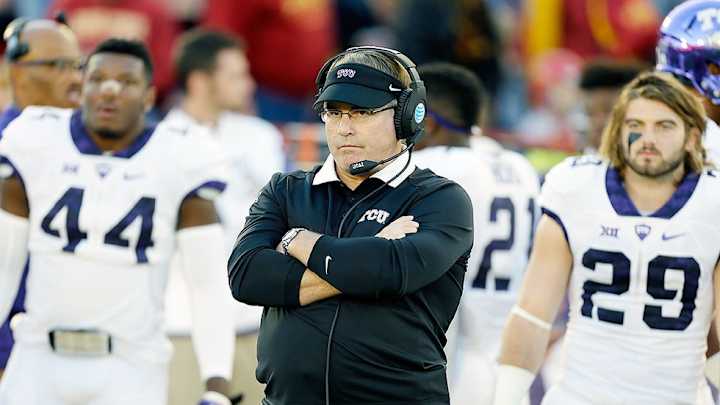
[video: 13724896]
When the NCAA Division I Board of Directors overturned the satellite camp ban, it directed the schools to take a holistic look at the football recruiting process and suggest ways to make it better. With coaches from four conferences (the Big 12, Pac-12, Mountain West and MAC) meeting in Phoenix last week, I asked a few how they might change the recruiting process if given the opportunity.
Naturally, the issue was fresh on coaches' minds. "The satellite camps should be an interesting arena," TCU coach Gary Patterson said. "It's going to be the wild west. Hopefully there will be some better answers the second time around." Patterson, whose school sits in one of the nation's richest recruiting areas (the Dallas-Fort Worth Metroplex), has no reason to like satellite camps. Most of the players the Horned Frogs recruit can drive to campus for camps. But Patterson understands why such camps would be useful for coaching staffs at schools located farther from recruiting hotbeds. He would prefer some common sense regulations.
For example, Patterson would like to see a rule that dictates a set number of days in which coaches may work camps either on or off their campuses. That would prevent staffs from working camps throughout the summer. I'm not sure that's necessary. Staffs should be able to work as much or as little as they want. No one is forcing anyone to work camps.
There is one possible issue with the satellite camp system that a rule could curb. Now, a college program can pay a high school any amount of money to host a camp the college coaches would then work. If that high school features recruits the college wants, that dynamic would provide an unfair advantage under the current NCAA framework*. Schools can pay high school coaches to work their on-campus camps, but the NCAA examines the payouts and can punish schools that pay one coach at a higher rate than another. There is no such way to control satellite camp payments. For instance, Big State could insist that renting the field at High School High costs $50,000, and no one could dispute it. If schools choose to regulate satellite camps next year, there is a simple solution: Require off-campus camps to take place at a four-year NCAA institution. This would allow Power 5 schools to send coaches into recruit-rich regions—as Oklahoma State coaches do when they work camps at the University of Mary Hardin-Baylor in Belton, Texas—but it would eliminate the opportunity to grease high school or juco coaches in exchange for special consideration during the recruiting process.
*Which, as I've noted many times, is dumb and needs to change. At any rate, I'd rather see the money go to the players rather than their high school coaches.
Patterson also believes the NCAA needs to change the dates of its dead periods. In a dead period, coaches can't host recruits on campus, and they can't see them off campus. The NCAA recently adjusted one winter dead period, and it most recently ran from Dec. 14, 2015 to Jan. 13, 2016. Patterson said this was approved with the intention of also approving an early signing period. Since the latter never went into effect, the longer dead period only forces coaches to compress their January recruiting. That creates a mad rush just before National Signing Day. Patterson said that time is especially tough on coaches at Group of Five schools who have recruits waiting to learn if they receive 11th-hour Power 5 offers. Patterson would like to see part of the dead period moved into the summer, which would also curb the amount of time coaches could work camps.
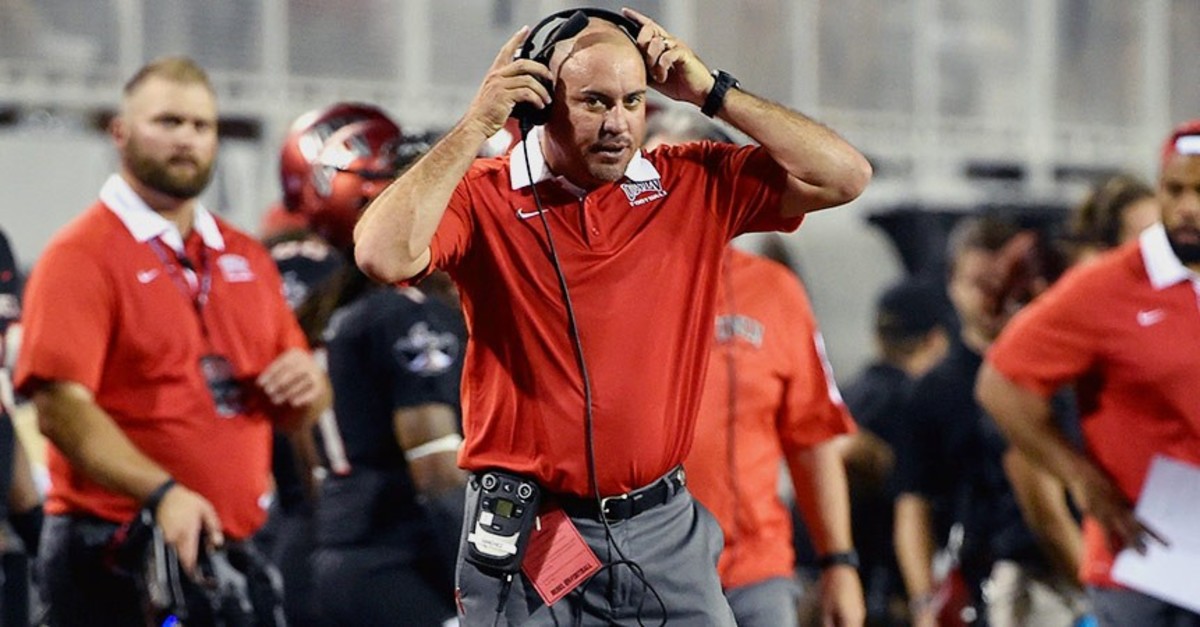
David Becker/Getty Images
UNLV coach Tony Sanchez, meanwhile, would rather see the satellite camps go away and be replaced by regional camps or combines that coaches would be allowed to attend. Coaches were permitted to attend such camps until 2007. They used to flock to Nike-sponsored camps on various campuses—much like college basketball coaches flock to elite travel-team tournaments in the summer—and assess prospects. "Set it up for anyone who can come," Sanchez said. "Then the staffs can come and get a true evaluation. I think most coaches would be in favor of that."
If that's the route schools choose—and Pac-12 commissioner Larry Scott suggested his league may put forth such a suggestion—then the events need to be less like combines and more like camps. Coaches aren't interested in watching players run the 40-yard dash. They trust their eyes when gauging speed. They want to see the best compete against the best. So, if these become the coaches' only opportunities to scout, they'll want to see players in one-on-one competition, pass skeleton and seven-on-seven drills. The issue with these camps is who would put them on. They would likely be outsourced to an apparel company or a recruiting service, and that solution isn't better than letting staffs set them up with other colleges.
Sanchez, the former head coach at Bishop Gorman High in Las Vegas, would also like to see the offer-and-commitment cycle slow down. Now, players are pressured to commit before the NCAA allows written offers or official visits. The question is how to ban a verbal scholarship offer, which doesn't officially exist under NCAA rules. Arizona's Rich Rodriguez thinks he has the answer.
A year ago, Rodriguez began exploring the idea of eliminating National Signing Day and allowing colleges to sign players at any point during their high school careers. This notion sounds counterintuitive to people who don't understand how recruiting works in 2016, but it would slow the process because each offer would correspond to one of a school's 25—or fewer—scholarships a year. Think about it this way: If you had to present a diamond ring the first time you said, "I love you," how long would you wait to utter those words? "It's an easier solution than looking at changing the recruiting calendar and visits," Rodriguez said. "Most of the other issues can be tied directly to that."
If this concept sounds familiar, it's because I wrote about it when Rodriguez suggested it last year. I also suggested it back in 2008, and the idea has only grown more practical since.
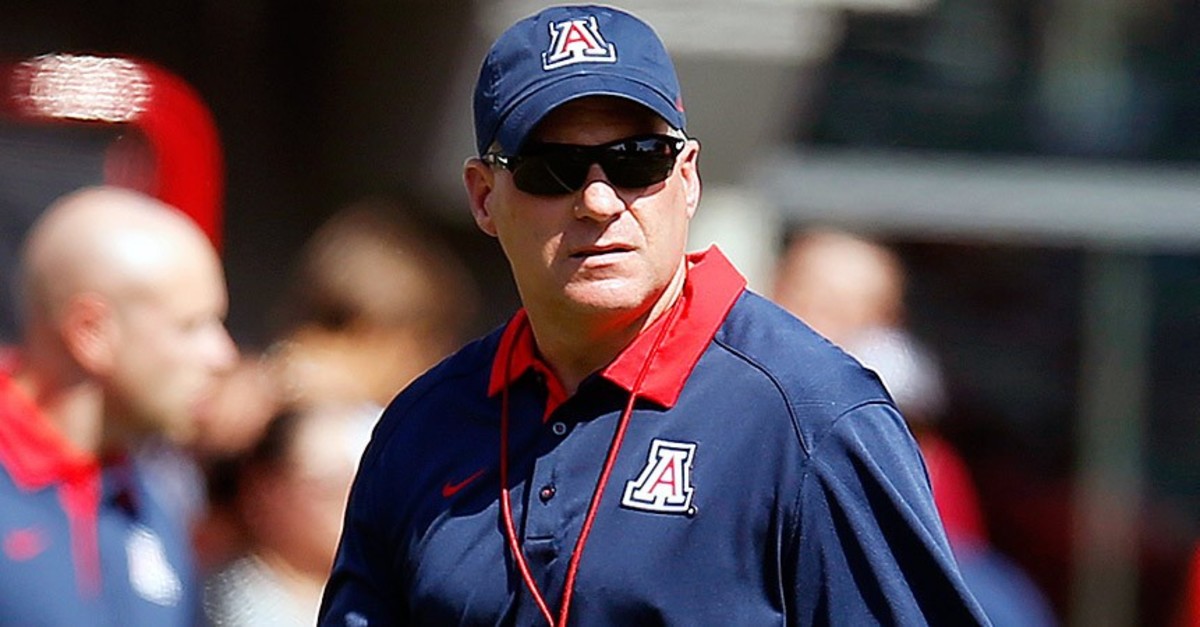
Rick Scuteri/AP
Rodriguez sits on the board of trustees of the American Football Coaches Association, and he is using that pulpit to spread the gospel of a world without National Signing Day. Would some coaches sign ninth- and 10th-graders? Of course. The dumbest ones would. Then they would get fired. Rodriguez pointed out that most schools' admissions offices would tap the brakes for their respective coaches. Unless a prospect's transcript absolutely sparkled, admissions would probably stop the coach from extending the offer. And if the coach extended it anyway and the player didn't qualify? "If you sign him and he didn't qualify, you made a mistake," Rodriguez said. "You've got to eat it."
When I proposed this idea, I suggested that players would have to stick with the school they chose or face penalties associated with breaking the National Letter of Intent. Rodriguez is nicer than me. He is in favor of creating a clause that releases a player from his commitment if the head coach he signed to play for leaves or gets fired. "Sometimes they pick a school," Rodriguez said. "Sometimes they pick a staff. You've got to protect them there." Though Rodriguez didn't say it, this model could also benefit coaches. It would make athletic directors think long and hard before firing anyone. If they did, they would do so knowing they might have to release much of their next recruiting class from their Letters of Intent.
We'll see if Rodriguez's plan gets any traction. Common sense ideas don't typically do well in the NCAA rule-making environment.
Meanwhile, one coach is less interested in making or changing rules than he is in enforcing the ones already on the books. Texas Tech's Kliff Kingsbury is still waiting for the promised crackdown on rule-breakers that would punish head coaches whose assistants run afoul of the NCAA's bylaws. "The biggest thing for me is that at times it seems like it pays to bend the rules a little bit," Kingsbury said. "You hear about and you see things going on, and it seems there are no true consequences."
Kingsbury isn't wrong. The risk-reward equation tilts heavily toward those who ignore the rules. This is a never-ending source of frustration for coaches who try to follow them. Logic would dictate that the schools and their governing body should either enforce the rules or eliminate the ones they don't want to bother enforcing. But we're talking about college sports here, so asking for logic is an even more difficult request than asking to eliminate National Signing Day.
A random ranking
I crowdsourced this week's topic, and Allen Kenny of BlatantHomerism.com delivered a beauty. I shall now rank the Police Academy movies.
1. Police Academy
Was there any doubt that this would top the list? It's Steve Guttenberg's finest work. Kim Cattrall makes her only appearance in the series. Michael Winslow, whose previous credits included one episode of The White Shadow, showcased his vocal talents. (This probably got him on Mel Brooks's Mr. Radar, so we can thank Police Academy for the Bleeps, the Sweeps and the Creeps in Spaceballs.) Plus, Lt. Harris was the only foil truly worth Mahoney's time. Here's Harris saying Move it, move it, move it in the French version.
2. Police Academy 4: Citizens on Patrol
This is the only other movie in the series to feature Mahoney-Harris conflict. Guttenberg was coming off Short Circuit and had Three Men and a Baby in the pipeline. He didn't need the badge anymore. This one introduced a slew of new recruits—House, whatever Billie Bird's character's name was—to join Hightower, Tackleberry, Callahan and all the others who didn't have Tom Selleck and Ted Danson to bail them out of the series.
3. Police Academy 2: Their First Assignment
The movie that introduced Bobcat Goldthwait to the wider world.
4. Police Academy 3: Back in Training
Now the wacky recruits from the first movie get to train the wacky new recruits.
5. Police Academy 5: Assignment Miami Beach
Commandant Lassard accidentally grabs a bag of stolen diamonds, and zaniness ensues. Matt McCoy plays his nephew, Miami police Sgt. Nick Lassard, as a sort of zombie-Mahoney.
6. Police Academy 6: City Under Siege
Police Academy debuted in 1984. This came out in '89. Nobody was trying to win an Oscar here.
7. Police Academy: Mission To Moscow
I'm not even going to pretend I saw this. Nor do I want to see it. But I might watch a two-hour documentary that explains how Christopher Lee and Ron Perlman got wrapped up in this.
First-and-10
1. Rest in peace, Greg Bryant. The former Notre Dame tailback was declared brain dead this weekend after he was shot in Florida only days before he was to report to join the reinstated program at UAB. West Palm Beach police are seeking help from anyone with information regarding the shooting.
2. Florida State dismissed Mario Pender immediately after the tailback's arrest Saturday on charges of domestic battery and strangulation. The dismissal ends a checkered career for Pender in Tallahassee.
3. The bizarre tweetstorm last week from Texas A&M receivers coach Aaron Moorehead seemed even stranger after Al Martell, the father of former Aggies quarterback commit Tate Martell, gave an interview to Rivals.com late last week.
First, the backstory. Tate Martell, from Bishop Gorman High in Las Vegas, announced via Twitter on Wednesday night that he would reopen his recruitment. Minutes later, Moorehead began tweeting. "I feel sorry for ppl who never understand loyalty," Moorehead wrote in a since-deleted tweet. "I can't really even vibe with u. At the end of the day trust is & everything else is BS." That and several other Moorehead tweets caused Texas A&M receiver commitment Mannie Netherly to announce that he was decommitting. It also caused Aggies receiver target Tyjon Lindsey to drop the program from consideration. Netherly may have been on his way out of the class anyway, and Lindsey was no lock, but this was still a bad look.
After reading Al Martell's comments, it's nearly impossible to understand why Moorehead would publicly express displeasure about Tate Martell's decision. According to Al Martell, Aggies coaches had cooled on his son since the hiring of new offensive coordinator Noel Mazzone. Mazzone's quarterbacks in the past have been much bigger than the 5' 11" Martell, and it's perfectly understandable if Mazzone wants to go in a different direction. It's his offense, after all. This isn't two weeks before National Signing Day. Martell has plenty of other options and plenty of time to explore them. Al Martell's comments suggest that the family understands the situation and decided to move on. So, why would Moorehead blast a player his fellow coaches may have been trying to move out of the class anyway? It makes no sense.
4. Paul Myerberg of USA Today pointed out something else that makes no sense in Moorehead's rant. How can a guy on his fourth job in six years lecture anyone about loyalty?
5. Oklahoma tailback/kick returner Alex Ross will graduate and play the 2016 season at another school. Ross, who was named first-team All-Big 12 as a kick returner in '14, got stuck behind Samaje Perine and Joe Mixon on the Sooners' depth chart, but he'll certainly be able to help the ground game of whichever school he chooses. He visited Missouri this weekend.
6. Logan Rudolph, a defensive end from Rock Hill, S.C., committed to Clemson in epic fashion.
7. After seeing Rudolph's attire in that commitment video, Florida coach Jim McElwain likely called an emergency staff meeting to devise a plan to flip him. Any man who can rock jorts with such panache probably belongs in Gainesville.
8. While many coaches are freaking out about being allowed to text recruits, Texas coach Charlie Strong is not. Strong said the majority of his text messages to recruits contain only two words. "The only thing I do is text a kid and say, 'Call me,'" Strong said. "I'm not going to go through a long thing with him." Strong understands texting won't lead to the fall of the republic, because the first staff to text a player 50 times in a day is probably getting dropped by that player. So, don't wear out your thumbs, coaches. If you text, "call me," and they want to talk to you, they'll call.
9. #BlueTurfProblems.
For the millionth time, it's not a lake, dude pic.twitter.com/vcA19kNsec
— Boise State Football (@BroncoSportsFB) May 2, 2016
10. This week in Jim Harbaugh …
[instagram:https://www.instagram.com/p/BFAVvtArSDd/]
What's eating Andy?
The Tampa Tribune died last week. That my former employer folded did not surprise anyone who has paid attention to the newspaper business. But the abruptness of its death—bought by the rival Tampa Bay Times and immediately shuttered—was shocking. The move left hundreds of good people out of work, and I hope they'll be O.K., because the people who worked at the Trib are, quite simply, the best.
If not for the Tribune, I wouldn't be doing this. A few weeks after graduating college, my newspaper job hunt going nowhere, I had applications for The Home Depot and Lowe's sitting next to me when a friend at the Trib called and said the paper would let me freelance for various community sections. I might be covering basketball camps for fourth-graders, but the paper paid real money. The folks in the sports department allowed me to write enough as a freelancer to stay afloat until I got my first full-time job.
Two years later, I had to quit that job—covering University of Tennessee sports for the Chattanooga Times Free Press—because my wife was about to start grad school back in Florida. I had been trying to get hired in the state with no luck for over a year, so I finally decided to leave my job in Tennessee and work whatever job I could find so she and I could be together. I had a lead on a job selling radio advertising. I'm a terrible salesman. So, I put in my two weeks notice in Tennessee and ran out the string.
On my last night in Knoxville, Tribune sports editor Duke Maas called and offered me an interview for a gig covering high schools in the Trib's farthest flung bureau. I was lucky enough to get that job, and for the next five and a half years I was blessed to work alongside some of the most wonderful people in the world. The Tribune never felt like a workplace. It felt like a family. That was always the difference between us and the Times. They had higher circulation, higher pay and more Pulitzers, but we had a lot more fun.
Bungling management at the top doomed the Trib years ago, but its spirit lived on through layoffs, furloughs and uncertainty. I hate that so many people got sent into the job market at once, but I know they can find new paths and thrive. It's just too hard to keep people as good as the ones at the Tribune down.
What's Andy eating?
I used to commemorate traditional grilling holidays by reminding folks that if their host handed them a hot dog or a hamburger, they were at a cookout and not at a barbecue. This began as a way to poke fun at Yankees who misuse the word describing my favorite food group, but it evolved into a definition of barbecue that couldn't possibly hold up to close scrutiny. That definition is this: Barbecue is any dead animal cooked low and slow over indirect heat.
Californians could easily puncture that definition by asking one question. What about Santa Maria-style cooking? It uses a crank-and-pulley system that allows the cook to raise or lower the meat over an open flame. This method of temperature control allows cuts of meat that normally would be tough to come out tender and juicy after a long cook. That sounds exactly like barbecue, even though the cooking method uses direct heat. And what about a place that uses indirect heat and direct heat on the same piece of meat? What do we call that?
If it's the tri-tip at Smokehaus in Scottsdale, Ariz., we call it delicious.
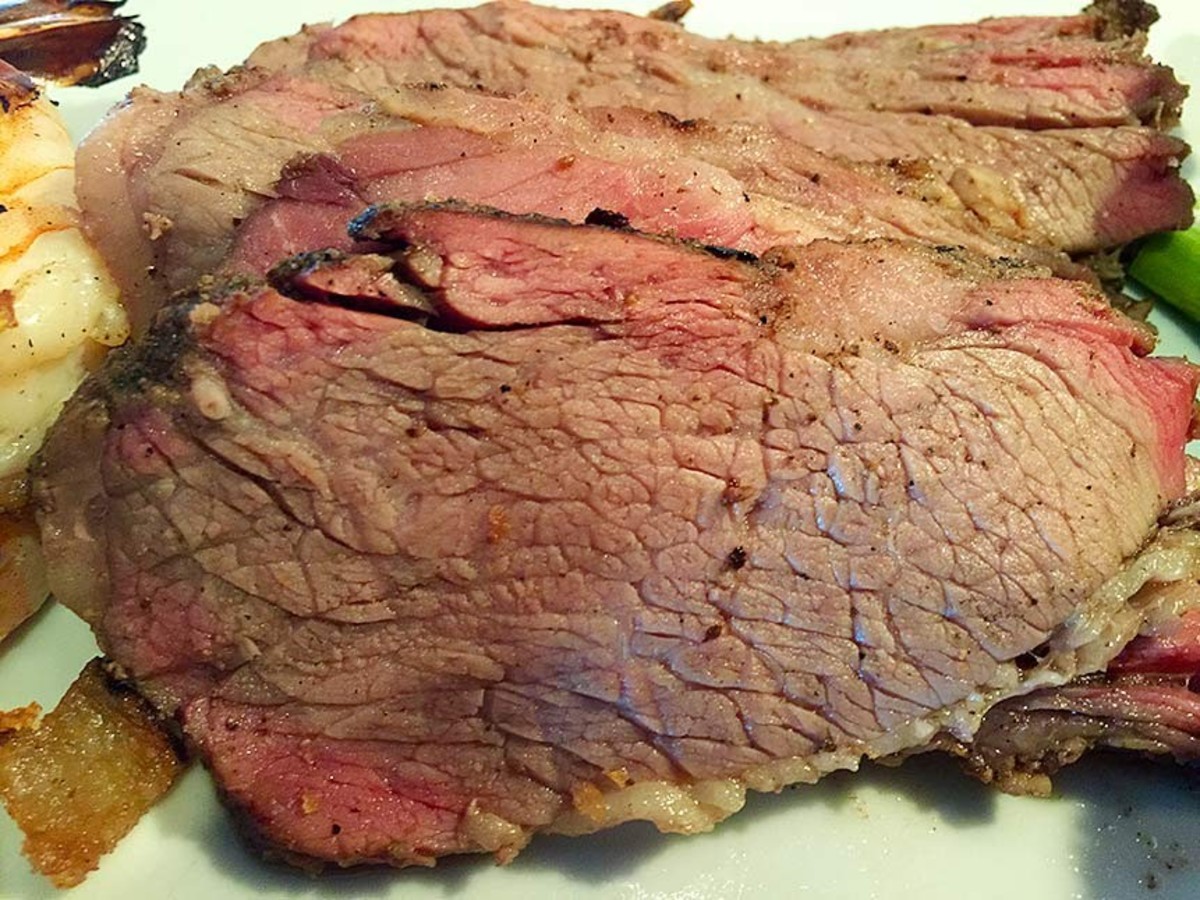
Andy Staples
You've probably bought top sirloin at the grocery store and wondered where the bottom sirloin goes. That's the tri-tip. It's not nearly as fatty as brisket, which is why it's simply roasted in many parts of the world. But in Santa Maria, Calif., it's cooked on elevator grills over red oak. This style is hard to find east of the Rockies, but it's becoming popular outside the region of its birth. In the Phoenix suburbs, the proprietors of sausage purveyor Brat Haus decided tri-tip would be the perfect meat around which to build a sister restaurant.
At Smokehaus, the tri-tip is smoked alongside pork, but it comes out after six hours and gets finished on a Santa Maria-style grill. Tri-tip is too lean to smoke as one would pork shoulder or brisket, but this method imbues the meat with a smoky flavor without drying it out. The direct heat at the end chars the outside, which makes for better bark than simple low-and-slow cooking. The result is, essentially, smoked steak. Smokehaus offers sauce. It isn't necessary.
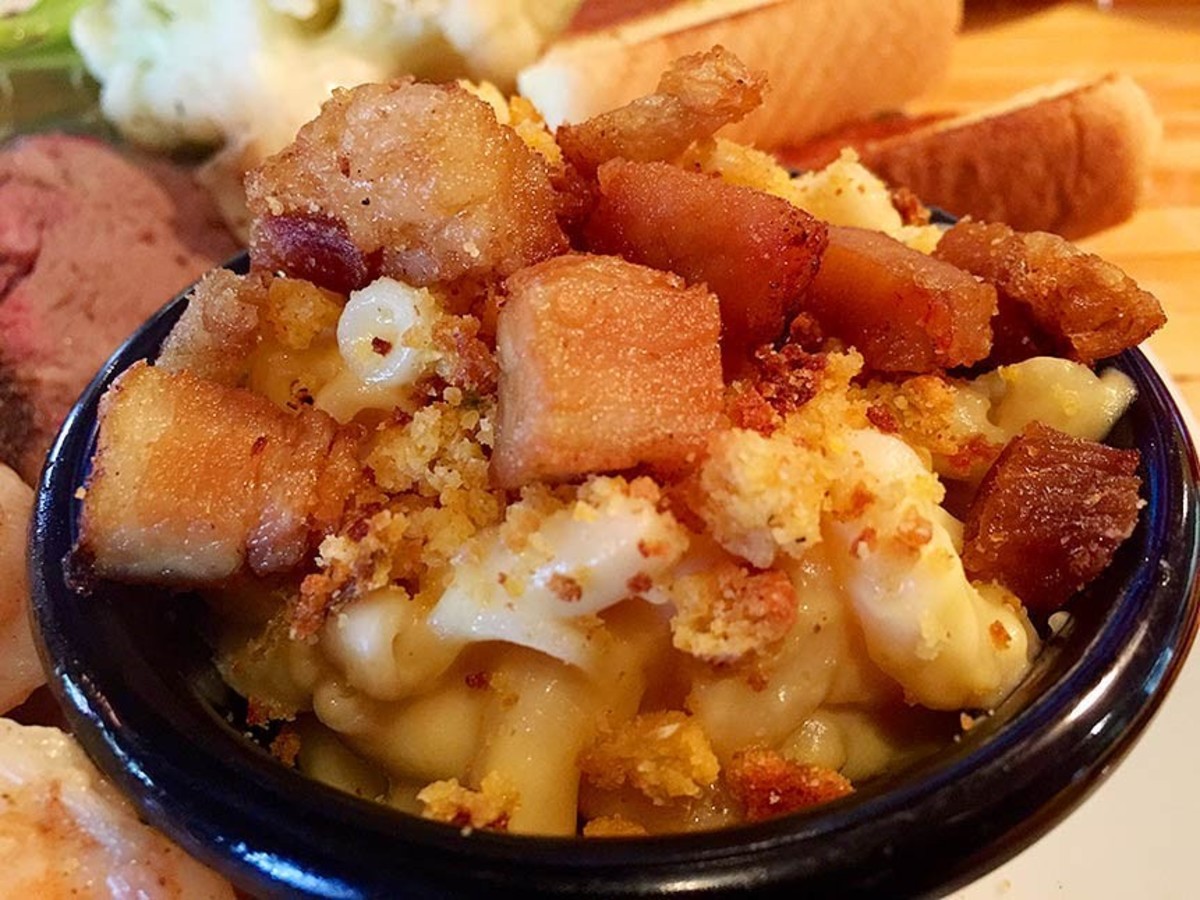
Andy Staples
Before that tri-tip, have a hunk of green chile cornbread. This should curb the pangs you'll feel immediately after the scent of Smokehaus hits your olfactory receptors. With the tri-tip, order the grilled vegetables—charred broccoli and cauliflower—and the pork belly mac and cheese. That's macaroni and cheese with chunks of pork belly. Last week's edition made clear my feelings on pork belly, and it works just as well in mac and cheese as it did on the burger at New York's Breakroom.
After all that, get some more tri-tip. Because it doesn't matter whether it fits my dumb definition of barbecue. All that matters is how it tastes.
